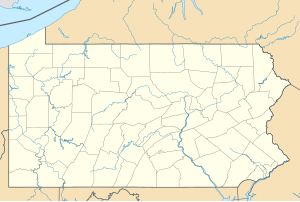Colemanville Covered Bridge
| Colemanville Covered Bridge | |
| Martic Forge | |
|
Wide view of the side of the bridge
|
|
| Official name: Pequea #12 Bridge | |
| Country | United States |
|---|---|
| State | Pennsylvania |
| County | Lancaster |
| Township | Conestoga, Martic |
| Road | T412 / T398 (single lane) |
| Crosses | Pequea Creek |
| Coordinates | 39°53′56″N 76°20′32″W / 39.89889°N 76.34222°WCoordinates: 39°53′56″N 76°20′32″W / 39.89889°N 76.34222°W |
| Length | 170 ft (52 m) |
| - Mainspan | 155 m (509 ft) |
| Width | 15 ft (5 m) |
| - Road width | 14 ft (4 m) |
| Overhead Clearance | 11.5 ft (4 m) |
| Builder | James C. Carpenter |
| Design | Burr Arch Truss Bridge |
| Material | Wood |
| Built | 1856 |
| - Reconstructed | 1992 |
| Owned and Maintained by | Lancaster County |
| NBI Number | 367224040815120 |
| WGCB Number | 38-36-26 |
| NRHP Ref Number | 80003534 |
| Load | 11 t (12 short tons) |
| Added to NRHP | December 11, 1980 |
| MPS | Covered Bridges of Lancaster County TR |
The Colemanville Covered Bridge is a covered bridge that spans Pequea Creek in Lancaster County, Pennsylvania, United States. After Hunsecker's Mill Covered Bridge, it is Lancaster County's second-longest single-span covered bridge still being used. It is also referred to as the Martic Forge Covered Bridge and Pequea #12 Bridge.
The bridge has a single span, wooden, double Burr arch trusses design with the addition of steel hanger rods. The deck is made from oak planks. It is painted red, the traditional color of Lancaster County covered bridges, on both the inside and outside. Both approaches to the bridge are painted red with white trim.
The bridge's WGCB Number is 38-36-26. In 1980 it was added to the National Register of Historic Places as structure number 80003534. The bridge is located on Fox Hollow Road just south of Pennsylvania route 324 in Martic Township, Pennsylvania. It is located at 39°53′56.01″N 76°20′31.90″W / 39.8988917°N 76.3421944°W (39.898892, -76.342194).
The Colemanville Covered Bridge was originally built in 1856 by James C. Carpenter at a cost of $2,244. After being damaged twice by flooding, it was partially rebuilt in 1938 by Edmund Gardner and 1973 by David Esh. Lancaster county completely rebuilt the bridge in 1992 for $350,000. During the restoration process the bridge was raised by 6 feet (1.8 m) and moved west a few feet to protect it from damage in potential future flooding.
...
Wikipedia


